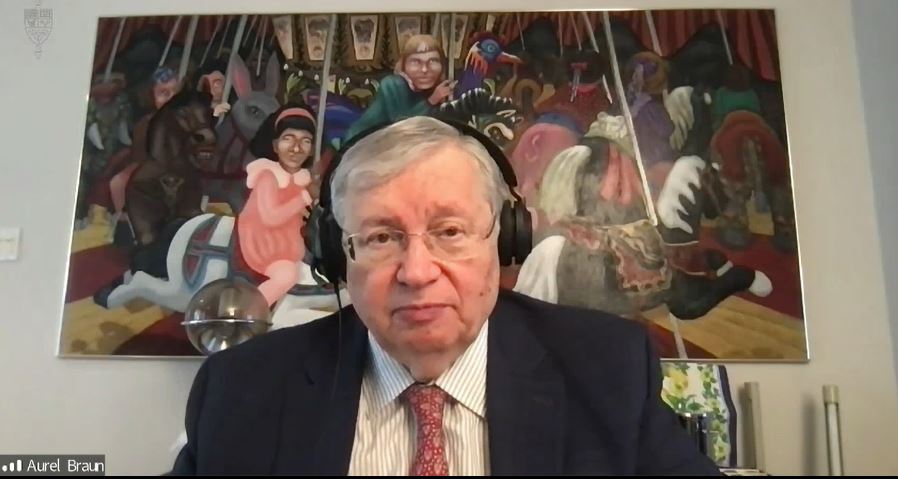The following is a transcript of Aurel Braun’s opening remarks in testimony before the Canadian House of Commons Standing Committee on Defence. He discusses Arctic security, Canada’s military presence, and the threat posed by Russia.
By Aurel Braun, October 27, 2022
A vast, forbidding region that is also enormously important strategically, the Arctic holds as much as 25% of the fossil fuel reserves in the world. Among Western states, however, the Arctic has hardly been a centre of geostrategic interest, and policy has often been driven by noble hopes and limited attention. In Canada, to some, the far North is too far, too large, and environmentally too hostile to attract foreign conquest or significant interference. It has been tempting, then, to view the Arctic in terms of a zone of peace and cooperation where the priorities are cultural exchanges, rescue operations and aviation regulations.
Unfortunately, to state an inconvenient truth, this attempt to segregate the region from global geopolitics has been a naive amalgam – a mirage of wishful Western thinking and Russian manipulation. I would respectfully suggest that we have no choice but to face a harsh geopolitical reality where any attempt to separate the international from the regional risks creating a dangerous illusion.
There are three major areas of concern in the Arctic that are deeply interrelated: the political; the economic/environmental; and the military. In all of these, Russia plays an outsized role that has been complicated further by climate change and the evolution of Russian-Chinese relations.
Certainly, we do need to appreciate that Russia, the largest Arctic state, has legitimate concerns and interests. No other country has as significant a percentage of its population or derives as much of its GDP from resource extraction and shipping in the region. Compare at least 20% of the GDP for Russia, in contrast to less than 1% for the U.S. The Russian threat, however, derives from motives and ambitions that go far beyond these legitimate national interests.
First, from a political perspective, Russia, which has an increasingly repressive personalist regime, is seized by four intertwined actual and pending crises that are key motor forces shaping foreign policy: a political legitimacy crisis; an economic crisis; a national identity crisis; and a succession crisis. Combined, these motor forces shape a Russian foreign policy that seeks to compensate for the failure of the Putin regime to create a successful modern state with diversionary “external successes”. Seminally, thus, domestic repression foreshadows external aggression.
Second, with an economy that is so highly dependent on energy extraction, with over 60% of exports consisting of fossil fuels, Russia has made the Arctic central both to its economy and to its political and military strategy. Though Moscow pays lip service to global climate concerns it has been an extremely poor custodian of the fragile ecosystem of the Arctic. It has engaged in massive and risky exploration, especially with funding help and direct involvement from China. As climate change has induced a significant decline in the amount and the thickness of sea ice, Russia has ignored the treat and focused exclusively on economic opportunity, stressing Arctic energy extraction and navigation. Moreover, Moscow overall, in a predictable progression, has moved from pipeline diplomacy, to weaponizing energy.
Third, despite Putin’s reassurances about not militarizing the Arctic and some Western assumptions of Arctic military exceptionalism, Russian military doctrine, going back to 2014, shows exactly the opposite. From a new generation of nuclear weapons, to its most advanced anti-aircraft system Russia has been engaging in a massive military build-up with more bases north of the Arctic Circle than all other countries combined and with more heavy icebreakers than all other states.
In conclusion, ostracizing Russia in the Arctic Council, recognizes Russian aggressiveness but is far from sufficient. As long as Russia remains a dictatorship with a failed economy that looks for political legitimacy via foreign adventures, as long as it is so energy-dependent, as long as it continues to drift from junior Chinese partner to a Beijing vassal, Moscow poses a growing threat that should be addressed with prudence but not with panic. Canada needs to: 1. have a permanent rather than just a persistent military presence in the Arctic; 2. achieve a qualitative edge in the face of Russian numerical superiority; and 3. with allies, including Sweden and Finland, build a credible regional northern military capability. Security and sovereignty are central concerns in light of 21st century geopolitics and there is no magical solution. There is little choice but to have an unwavering commitment, a major investment in hard power and consequent economic sacrifices to make certain that Canada is never viewed as a soft and tempting target.
Aurel Braun is Professor of International Relations and Political Science at the University of Toronto and Associate at the Davis Center for Russian and Eurasian Studies, Harvard University.






